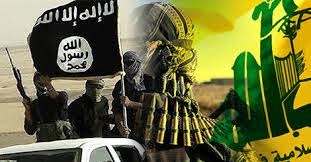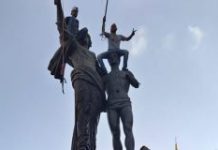ISIS heralds the dawn of a dark age in the Arab world
Dr. Halla Diyab/Al Arabiya
Monday, 13 October 2014
This article is the last in a three-part series exploring the erosion of the 2011 Syrian uprising.
In almost all the videos posted from Syria, most rebel fighters are bearded, shouting “Allahu Akbar” (God is great) every time they kill a regime soldier or target a military base. Female international reporters would appear veiled when reporting from rebel-held areas. The international community still views them as moderates.
When Aleppo was controlled by rebels in 2013, the Washington Post reported that they cooperated with al-Qaeda affiliate Jabhat al-Nusra to operate a sharia council and impose Islamic law on one of the most diverse cities in Syria. Similar cooperation took place in rebel-held areas along the Euphrates river, and in Raqqah and Deir al-Zour. This makes it very difficult to distinguish moderate rebels from extremists.
“It is vital for the West to pursue a feasible solution to the Syrian conflict besides airstrikes against ISIS, to prevent it spreading through the region”
The brutality of some rebels – the most atrocious example being the removal of a Syrian soldier’s heart – is no different to that of the Islamic State of Iraq and Syria. With demographic chaos and political unrest in Syria, arms have been easily passed between groups who claim to oppose Assad.
Rebel loyalty
There is also the question of rebel loyalty. One day a fighter may claim to stand with a “reasonable” faction, and tomorrow could declare allegiance to ISIS. There is also the problem that for some “moderate” Sunni rebels, the Syrian regime is a more pressing enemy than ISIS.
It is vital for the West to pursue a feasible solution to the Syrian conflict besides airstrikes against ISIS, to prevent it spreading through the region. The ongoing Syrian civil war, the regime’s aggression, the opposition’s failure to unite Syrians and draw a unified plan for the country post-Assad, the flow of arms, Islamism, and the lack of reforms in Syria are all fostering the growth of ISIS. The West should prioritize addressing the root causes that nurture such groups.
Moderate Muslim voices should be empowered to reach young Muslims in the West and the Middle East who are vulnerable to extremism. Efforts of leading moderate Muslim scholars should be reinforced, and de-radicalization programs should help jihadists understand that ISIS is not Islamic, and that its actions are against the principles of the religion and the teachings of the Prophet Muhammad. Furthermore, a pan-Arab counter-extremism strategy is necessary.
The international community should offer concrete support for a political solution to the Syrian crisis. This can restore security, and create a sense of normality and political stability in Syria, which would make it very difficult for jihadist ideologies to take root and expand territorially. The United States must persuade Arab countries to focus on cutting off arms and funding to jihadists. It should also initiate strategies with Turkey to control its borders to stop jihadists entering Syria
ISIS is dragging Syria and the Middle East into a new dark age. Today, Syrians’ responsibility is to stand together against extremism. The Syria that the uprising yearns to see is a civic, democratic country, where different religions and sects coexisted for thousands of years. Syrians have hope in U.S. President Barack Obama’s pledge to help “Muslim communities around the world not just in the fight against terrorism, but in the fight for opportunity, tolerance, and a more hopeful future.”
Part 1: How the Syrian uprising led to ISIS’ rise, not democracy
Part 2: How Syria’s uprising blurred moderate, extremist lines
Home LCCC English Daily Detailed News Bulletins Dr. Halla Diyab/ISIS heralds the dawn of a dark age in the...
















